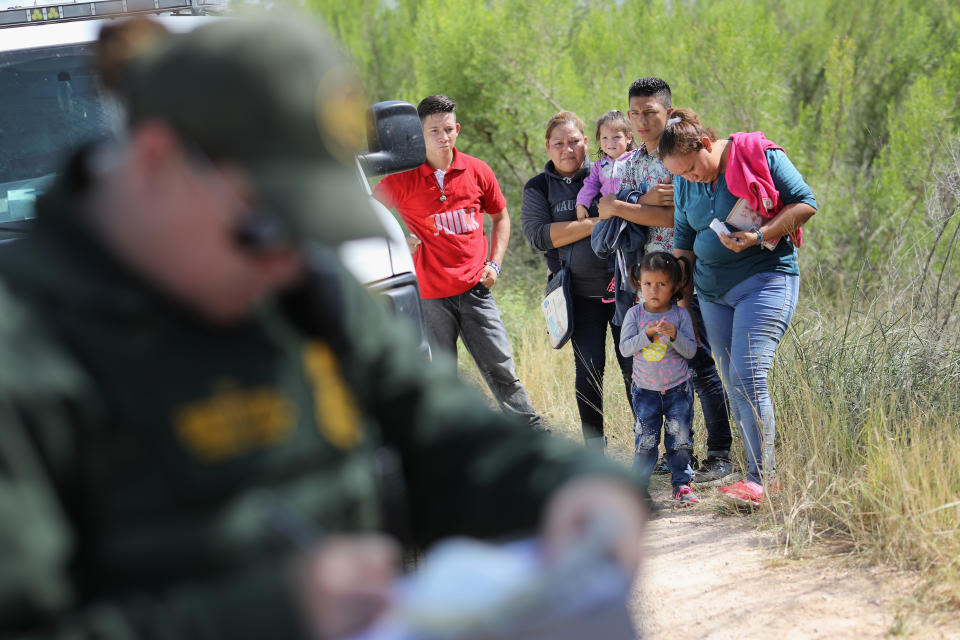Sessions targets a new breed of asylum seekers, persecuted for their gender or for escaping gangs

When Americans think of foreigners seeking asylum, they most likely imagine political dissidents fleeing the secret police in their home countries. But the controversial new policy announced this week by Attorney General Jeff Sessions severely restricting the grounds for granting asylum reflects a new reality about who seeks protection at America’s borders: people threatened by interpersonal violence who aren’t being protected by their own governments.
“People who seek asylum these days not are not the typical political dissenter threatened by [their] government,” Ashley Huebner, a managing attorney with the National Immigrant Justice Center, told Yahoo News. She cited hypothetical but realistic examples, such as a woman in Ethiopia who fears female genital mutilation or a gay Iranian man threatened with death because of his sexual orientation.
Sessions declared this week that victims of domestic abuse and gang violence should, in general, not qualify for asylum in the United States, creating a new and virtually impenetrable barrier for the majority of Central Americans seeking asylum at the U.S. border.
It was a move that immigration attorneys and human rights advocates had been anticipating for months, ever since Sessions announced back in March that he would be taking the unusual step of referring to himself for review a 2016 ruling by the U.S. Board of Immigration Appeals that granted asylum to a woman from El Salvador who’d fled her abusive husband and entered the U.S. illegally, claiming that she feared for her safety if forced to return home. The ruling created a precedent allowing foreign victims of spousal abuse and other forms of interpersonal violence committed by non-state actors to be considered eligible for asylum in the United States.
“Generally, claims by aliens pertaining to domestic violence or gang violence perpetrated by non-governmental actors will not qualify for asylum,” Sessions wrote in his 31-page decision to reverse the ruling. “The mere fact that a country may have problems effectively policing certain crimes — such as domestic violence or gang violence — or that certain populations are more likely to be victims of crime, cannot itself establish an asylum claim.”

It remains to be seen how, exactly, the attorney general’s reversal of this landmark ruling will play out in practice. But it was immediately clear that the move stands to have the greatest impact on asylum seekers from Central American countries where, in recent years, rampant violence has driven large numbers of migrants to make the perilous journey through Mexico in hopes of finding refuge north of the border.
Government data reflecting exactly how often asylum claims are made under the categories now excluded by Sessions’s decision is not ready available. However, numbers from U.S. Customs and Immigration Services, whose asylum officers conduct “credible fear” screenings of individuals who tell a Customs and Border Protection agent that they would like to seek asylum after being apprehended at the border, show a significant surge in such credible fear cases within the last decade — from 5,232 total completed cases in 2009 to a record high of 92,071 in 2016 and down slightly to 79,977 in 2017. Of those cases completed in 2017, 60,566 individuals were deemed to have established a credible fear of persecution or torture upon returning to their home country, meaning they would be allowed to remain in the country while applying for asylum in immigration court — a lengthy process with relatively low rates of success.
“The vast majority of asylum cases that are from Central America are based on fear of harm related to gang violence and domestic violence,” said Judge Ashley Tabaddor, president of the National Association of Immigration Judges.
The decision is just the latest in a series of small but significant changes Sessions has made over the past year or so to the immigration courts which, unlike the criminal justice system, exist within the Department of Justice and fall directly under the control of the attorney general. It also comes amid disturbing reports from the southern U.S. border of family separation, arrests, and detention of asylum seekers, many of them fleeing violence at home in Central America.
Asylum officers tasked with evaluating the credibility of an individual’s claim that they fear returning home await instructions for how the attorney general’s decision should be implemented on the border.

U.S. Citizenship and Immigration Services “is carefully reviewing proposed changes to asylum and credible fear processing whereby every legal means is being considered to protect the integrity of our immigration system from fraudulent claims,” USCIS spokesman Michael Bars told Yahoo News. “The attorney general’s decision will be implemented as soon as possible.”
Bars echoed Sessions’s common refrain that so-called loopholes in U.S. asylum laws are being exploited by people without legitimate claims of fear. But others view the ruling as part of a broader attack on Central American asylum seekers in particular.
“This appears to be a very results-driven decision, intended to target a very specific population,” said Huebner. She said it was “factually inaccurate” for Sessions to claim that domestic violence in the U.S. is comparable to levels in other countries. In El Salvador, for example, gender-based violence is so pervasive that Amnesty International considers it “one of the most dangerous countries to be a woman.” Guatemala’s high femicide rate has been tied to inaction by the government in response to violence targeting women.
Huebner also noted that Central America is hardly the only part of the world from which individuals seek asylum from harm by non-state actors, an indication of how violence and persecution have evolved around the globe in the decades since the U.S. first established its criteria for asylum seekers in the wake of World War II.
A Justice Department spokesperson told Yahoo News specifically that the attorney general’s decision on this matter would not preclude asylum for victims of female genital mutilation, but Huebner was skeptical of any such promise. Sessions’s language, she argued, is vague enough to cover a range of scenarios, and cases will be decided on an individual basis, so the effect of the new policy will play out over time.
But Huebner predicted that the immediate ramifications for those seeking asylum at the border will be “devastating.”
“I think it’s going to make it much more difficult for anybody seeking asylum from Central America and Mexico, unless they have one of the rare cases where they’ve been persecuted by government entities,” she said.
_____
Read more from Yahoo News:
Obama official: ‘We should have done more’ on Russian interference in 2016 election
Sage grousing: Senators charge Interior is holding up conservation grants
California’s Gavin Newsom wants to lead the way to a post-Bernie, post-Hillary party
The Eighth Circuit strategy: How abortion foes are lining up cases to challenge Roe



